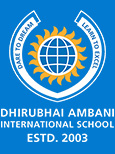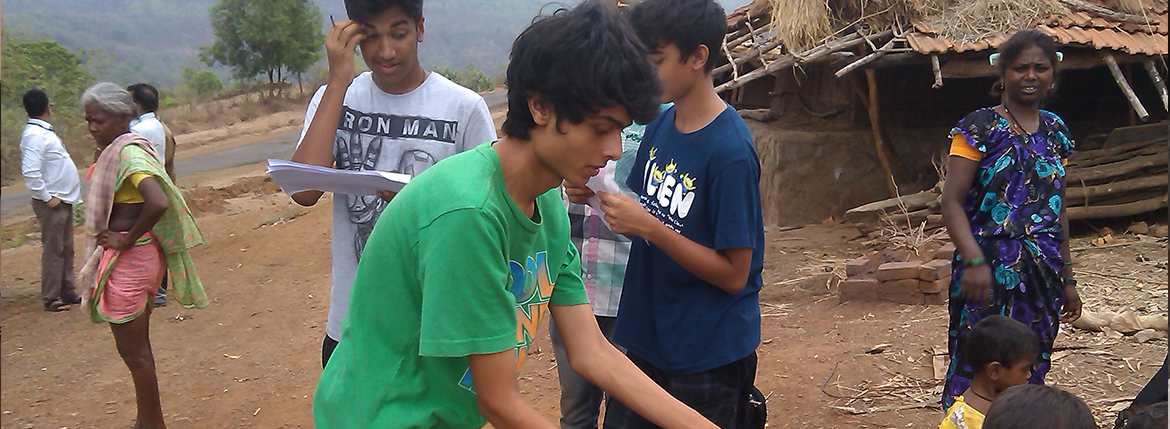DAIS INITIATIVE AT THE LEARNING SPACE FOUNDATION
What is the Learning Space Foundation?
The Learning Space Foundation is a service initiative begun by Mr Nitin Orayan, located in Vajreshwari in Thane district. The initiative is to provide support to village children attending rural schools, assisting them by providing them a supplementary learning program, teaching them English and Mathematics. The centre also provides art, drama and computer lessons to 5000 children from the surrounding district and supports 350 village schools.
The Centre is recognised by The Maharashtra Government and is funded by several corporates including Standard Chartered Bank.
How did I get to know them?
I first came across the foundation, whilst visiting the Vajreshwari falls. Located in a small village called Kelthan, the Learning Space Foundation is located at a distance of 2 hours from Mumbai. Upon visiting several of these schools, I was appalled by the limited infrastructure at their disposal and the unhygienic and insanitary conditions in which the students studied and lived in.
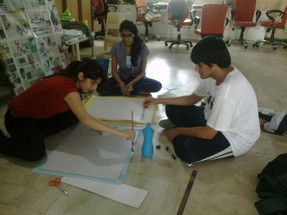
Problems related to health and hygiene: I learnt that children in the vicinity were faced with the threat of contracting several diseases such as Malaria, Typhoid, Cholera and other fatal ailments. I realised that the problem lay in the unhygienic conditions in which they lived in. These diseases were a potent problem in rural as well as urban area, and are generally waterborne diseases or chronic ailments due to the consumption of an unbalanced diet.
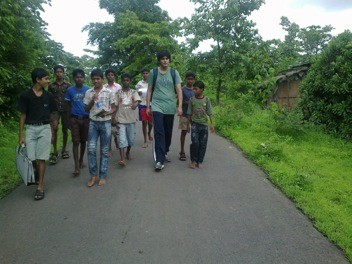
What I decided to do?
I came to the realization that the easiest way to prevent such fatal diseases is to increase awareness. With this idea in mind, I founded the Health and Hygiene Club, with two friends from my school. We came up with the idea that we should target children in the age group of 8-14, as they are most impressionable at that stage. In addition, we decided to create interactive lessons in their local language and impart the same education in a fun way. The lessons were funny but thought provoking for the children and were followed by a short quiz to understand their retention.
We travelled most weekends to village schools in the interiors of the district and we realised that it was only the tip of the iceberg – there were so many more of schools that we needed to reach. While visiting the schools, we learned that the government of Maharashtra, as part of its drive to make the schools more connected, had donated television sets and DVD players to many schools in the vicinity. This gave us the idea that we could shoot a basic film incorporating our lessons.
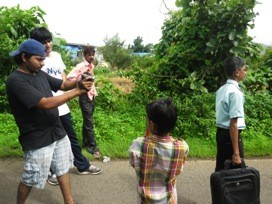
Shooting the Film:
We therefore decided that, over the summer break, we would conceptualise and shoot a documentary casting the village children. This film could then be distributed amongst the schools and shown to other children. This way our project could be both far-reaching and sustainable.
It was important that the film be scripted in an informative and interesting manner so as to hold the attention of the audience. Thus over the summer break, we scripted, casted and trained the village children to act their parts in the film.
One constraint was the shoestring budget with only inexpensive equipment at our disposal. So, we used a simple movie camera owned by a friend and shot the film. We used the local language with catchy background music and bright outdoor locations around the learning centre.
The film covered the following topics:
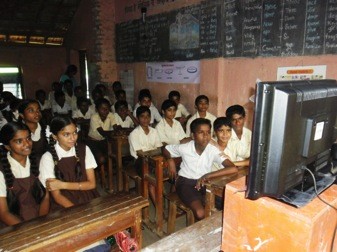
Distribution:
The most important part of the process was its distribution. The first screening of the film was held in a local high school attended by 150 children on 15th August 2012, which is also India’s Independence Day. The session was attended by officials from the Rotary Club of Bombay Airport, a leading humanitarian association in the city. Following the screening of the film was an interactive session in which I quizzed the attending students as well as spent time with them discussing the film’s content, trying to gauge if they had been following the film. This was followed by a contest, where students viewing the film were asked questions after which food pyramid charts were handed out to each child.
We were also able to gain the assistance of the Rotary Club towards the duplication of the film DVDs for the 350 schools in the district. The film has also since been edited, subtitled and uploaded on YouTube to widen its reach and availability and can be viewed on the following link: http://youtu.be/bwmGNSRMqxw
The Learning Space Foundation is a service initiative begun by Mr Nitin Orayan, located in Vajreshwari in Thane district. The initiative is to provide support to village children attending rural schools, assisting them by providing them a supplementary learning program, teaching them English and Mathematics. The centre also provides art, drama and computer lessons to 5000 children from the surrounding district and supports 350 village schools.
The Centre is recognised by The Maharashtra Government and is funded by several corporates including Standard Chartered Bank.
How did I get to know them?
I first came across the foundation, whilst visiting the Vajreshwari falls. Located in a small village called Kelthan, the Learning Space Foundation is located at a distance of 2 hours from Mumbai. Upon visiting several of these schools, I was appalled by the limited infrastructure at their disposal and the unhygienic and insanitary conditions in which the students studied and lived in.

Problems related to health and hygiene: I learnt that children in the vicinity were faced with the threat of contracting several diseases such as Malaria, Typhoid, Cholera and other fatal ailments. I realised that the problem lay in the unhygienic conditions in which they lived in. These diseases were a potent problem in rural as well as urban area, and are generally waterborne diseases or chronic ailments due to the consumption of an unbalanced diet.

What I decided to do?
I came to the realization that the easiest way to prevent such fatal diseases is to increase awareness. With this idea in mind, I founded the Health and Hygiene Club, with two friends from my school. We came up with the idea that we should target children in the age group of 8-14, as they are most impressionable at that stage. In addition, we decided to create interactive lessons in their local language and impart the same education in a fun way. The lessons were funny but thought provoking for the children and were followed by a short quiz to understand their retention.
We travelled most weekends to village schools in the interiors of the district and we realised that it was only the tip of the iceberg – there were so many more of schools that we needed to reach. While visiting the schools, we learned that the government of Maharashtra, as part of its drive to make the schools more connected, had donated television sets and DVD players to many schools in the vicinity. This gave us the idea that we could shoot a basic film incorporating our lessons.

Shooting the Film:
We therefore decided that, over the summer break, we would conceptualise and shoot a documentary casting the village children. This film could then be distributed amongst the schools and shown to other children. This way our project could be both far-reaching and sustainable.
It was important that the film be scripted in an informative and interesting manner so as to hold the attention of the audience. Thus over the summer break, we scripted, casted and trained the village children to act their parts in the film.
One constraint was the shoestring budget with only inexpensive equipment at our disposal. So, we used a simple movie camera owned by a friend and shot the film. We used the local language with catchy background music and bright outdoor locations around the learning centre.
The film covered the following topics:
- Importance of outdoor activities and exercise.
- Importance of regular health check-ups.
- Importance of clean drinking water and boiling water as a way to ensure this.
- Importance of a balanced diet including the importance of Carbohydrates, Proteins, Fats, Vitamins and Minerals. This was portrayed with the help of props and visual aids so as to increase the retention amongst our viewers.
- Importance of brushing, hand-washing, bathing and personal hygiene.
The title of the film was decided as ‘Sacche Dhan Ki Raksha’ or ‘Conserving True Wealth’. A Learning Space Foundation local volunteer helped us with the direction and editing of the film and no professional help was sought.

Distribution:
The most important part of the process was its distribution. The first screening of the film was held in a local high school attended by 150 children on 15th August 2012, which is also India’s Independence Day. The session was attended by officials from the Rotary Club of Bombay Airport, a leading humanitarian association in the city. Following the screening of the film was an interactive session in which I quizzed the attending students as well as spent time with them discussing the film’s content, trying to gauge if they had been following the film. This was followed by a contest, where students viewing the film were asked questions after which food pyramid charts were handed out to each child.
We were also able to gain the assistance of the Rotary Club towards the duplication of the film DVDs for the 350 schools in the district. The film has also since been edited, subtitled and uploaded on YouTube to widen its reach and availability and can be viewed on the following link: http://youtu.be/bwmGNSRMqxw
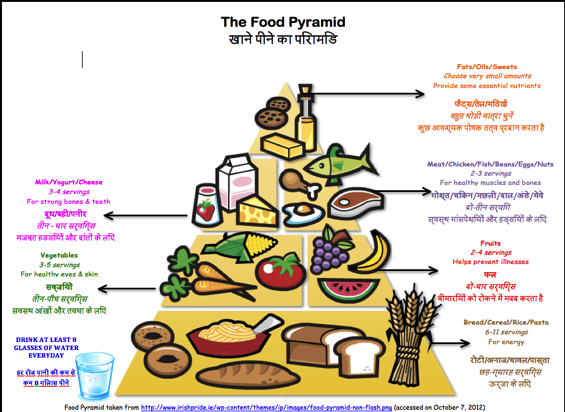
Response:
While conducting these interactive screening sessions, I was happily surprised to find that the children attending these seminars seemed engrossed and sometimes even entertained by the film’s content. That led us to believe that the interesting and funny dialogues seemed to appeal to the children. In addition, upon quizzing them I realized that the content of the film had been delivered in a concise manner, which was comprehensible to most students between ages 8 through 14. When I visited the village recently, I chose to look into the impact our film had made. I was heartened to hear from Rajesh’s response who was prone to falling sick and missing school. He said that incorporating hand-washing as well as following a balanced diet after watching the film had helped him become healthier and he missed out lesser days of schools. We were also congratulated by several school heads who believed that the video was a great way in promoting interactive learning and allowed students to grasp concepts faster than usual.
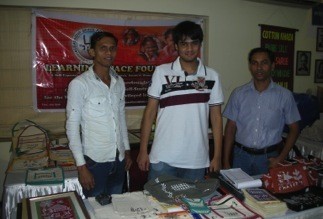
Other Activities conducted to help the community:
- On one of our visits to the school, we learned that the children who would appear for the class 10 standardised exams of Maharashtra did not have geometry compass boxes. These were needed immediately. I appealed to my father and the Alumni Association of his high school to donate a small sum of Rs 10000 ($ 200) for the same. The Association reached out to its alumni and a kind patron from Dubai, UAE did the needful. Thankfully, the 200 children appearing for the exams had instruments on time.
- The Learning Space Foundations supports Warli artists. Warli is a form of traditional art in the local district and state. Unfortunately, due to the lack of support and patronage, it is often referred to as a dying form of art. Upon viewing some of their designs, my friends and I helped them develop gift products that were suitable for the corporate world in Mumbai. Products designed included eco friendly cloth bags, pen-stands, Warli gift-cards. We also helped them to participate in a local craft exhibition held by the Rotary Club of Airport on 24th August 2012, where their products could be displayed to end customers.
- Through the Rotary Club of Bombay Airport, we also made a project report for a local furniture manufacturing company to donate wooden chairs and tables to the village schools. 70 chairs and 6 tables were donated to the foundation.
- With the help of my father, I was able to invite a prominent news channel in India- ‘CNN-IBN’ to cover Mr. Orayan’s work as a part of their coverage. This was a great way to gain support for the fantastic initiatives he has launched, as well a possible source of much needed sponsorship. The programme was aired in summer 2012 as a part of their show ‘India Positive’. I have also written a letter to the production team of their news network to nominate Mr. Orayan for their ‘Real Hero’ Award. The prize money of Rs 500,000 ($ 9000) would go a long way in helping LSF’s cause.
Efforts to make the project sustainable:
- In order to ensure further reach of this film, I have approached ‘Sneha’, an NGO working with slum children in Mumbai, with the film. Plans are underway to edit the film and make it suitable to be viewed by a much larger audience.
- I have also approached several corporate houses like Colgate and Hindustan Lever, appealing to them to use the film as part of their corporate social drives.
- As a desire to make the project sustainable over the long term, I appealed to the CAS co-ordinators at my school. On one Sunday afternoon, I arranged a visit for my schoolteachers to attend a screening of my video at a local high school as well as interact with members from the Learning Space Foundation. We are hoping to develop a two-way exchange programme, where children from my school can visit the villages and follow up on the lessons. It can be incorporated in the school’s community outreach programmes. I also suggested if the children from these village schools could visit DAIS and be taught/mentored by the IB students. I’m proud to say that the project is under serious consideration and modalities on how to finalise the same are being discussed. In exchange, students from my school could visit Vajreshwari where they will be given lessons on the local culture including Warli arts and other traditional dances. Students studying Biology would be given lessons on Organic farming and taught about the local biodiversity, vegetation.
- We are also considering the creation of an e-learning exchange programme between students from the Learning Space Foundation and interested students from my school. This would include every student in my high school adopting a student from the village and teaching him/her English, Science and Mathematics. In exchange students, from DAIS would benefit greatly by learning about the local agriculture, flaura-fauna and biodiversity. This programme is to be named ‘Village-Buddy’.
Before I matriculate into college, I have a desire to initiate another project for The Learning Centre. The children in the villages walk many kilometres everyday simply to get to school and back. They can’t even afford simple bicycles to commute. In contrast, many children in the city and suburbs have 2-3 cycles each. Some of them are rotting away unused. It’s my idea to formulate a plan to collect these old, unused cycles, repair them at minimal cost and distribute the same to the children.
A sequel to the film:
Efforts are being made to approach corporates and other NGOs to help sponsor the shooting of the film on a more sophisticated level and in multiple languages, which can then be broadcasted on television or via other media. Even after joining college, I would like to expand on the progress made by my initiative. I have planned a sequel film, which would cover, in greater depth, the compelling issues we aim to spread awareness about.
The following topics will be considered in the film’s sequel:
- Importance of Vaccinations.
- Sterilization of milk bottles and importance of boiled milk.
- Importance of hygienic toilets to encourage female attendance in schools.
- Washing fruits and vegetables before consumption.
- Application of simple mosquito repellent before playing outdoors.
